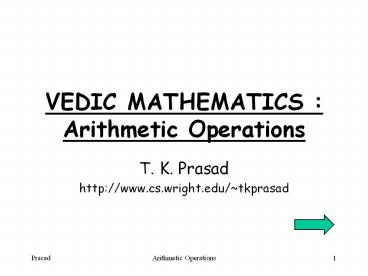VEDIC MATHEMATICS : Arithmetic Operations - PowerPoint PPT Presentation
Title:
VEDIC MATHEMATICS : Arithmetic Operations
Description:
Title: PowerPoint Presentation Last modified by: T. K. Prasad Created Date: 1/1/1601 12:00:00 AM Document presentation format: On-screen Show Other titles – PowerPoint PPT presentation
Number of Views:268
Avg rating:3.0/5.0
Title: VEDIC MATHEMATICS : Arithmetic Operations
1
VEDIC MATHEMATICS Arithmetic Operations
- T. K. Prasad
- http//www.cs.wright.edu/tkprasad
2
Positional Number System
TEN-THOUSANDS THOUSANDS HUNDREDS TENS UNITS
43210 4 10,000 3 1,000 2 100 1
10 0
3
Adding Numbers
- Unary System
- !!! !!!!!!!!
- !!!!!!!!!!!
- Roman System
- III VIII
- XI
Too laborious and unreadable!
Not uniform, Not incremental!
4
- Arabic System
- 45 31
- 4 10 5
- 3 10 1
- 7 10 6
- 76
5
- Arabic System (introducing carry)
- 45 36
- 4 10 5
- 3 10 6
- 7 10 11
- 7 10 1 10 1
- 8 10 1
- 81
6
Subtracting Numbers
- Unary System
- !!!!!!!!!!! - !!!!
- !!!!!!!
- Roman System
- XI - IV
- VII
7
- Arabic System
- 45 31
- 4 10 5
- 3 10 1
- 4 3 10 5 1
- 1 10 4
- 14
8
- Arabic System (introducing borrow)
- 65 - 36
- 6 10 5
- 3 10 6
- 6 3 10 5 6
- 5 10 1 10 5
- 3 10 6
- 5 3 10 10 5
6 - 2 10 15
6 - 29
9
Recap Positional Number System
TEN-THOUSANDS THOUSANDS HUNDREDS TENS UNITS
43210 4 10,000 3 1,000 2 100 1
10 0
10
Prerequisite / Background
- Single Digit Addition
- E.g., 4 5 9
- With carry
- E.g., 4 8 12
- Single Digit Subtraction
- E.g., 9 - 5 4
- With borrow
- E.g., 12 - 04 08
11
Multiplying Single Digit Numbers
- 1 2 2
- 1 x 2 2
- 3 4
- 4 3
- 12
- 5 5
- 25
12
Single Digit Multiplication (of Large Digits in
terms of Small Digits) using Vedic Approach
- Method Vertically and Crosswise Sutra
- Correctness and Applicability
13
10s Complement
10s complement of a digit d is (10 d).
- TC(6)
- 4
- TC(8)
- 2
- TC(9)
- 1
- TC(1)
- 9
- TC(3)
- 7
- TC(4)
- 6
14
Method Multiply 7 8
- Write the first digit to be multiplied and its
10s complement in the first row, and the second
digit to be multiplied and its 10s complement in
the second row. - 7 3
- 8 2
15
- 7 3
- 8 2
- To determine the 2-digit product
- subtract crosswise to obtain the left digit
- (7 2) (8 3) 5
- and
- multiply the complements vertically to obtain the
right digit. - (3 2) 6
- 7 8 56
16
Another Example
- 8 9
- 8 2
- 9 1
- 7 2
- 8 9 72
17
Questions
- Why do both crosswise subtractions yield the same
result? - Why does this method yield the correct answer for
this example? - Does this method always work for any pair of
digits?
18
Proof Sketch
- (8 3) (7 2) 5
- Why are they same?
- That is, the difference between first digit and
10s complement of the second digit. - (8 (10 7)) (8 7 10) (15 10) 5
- (7 (10 8)) (7 8 10) (15 10) 5
19
Correctness ArgumentTwo possibilities
- 8 (10 2)
- 7 (10 3)
- 8 7
- (10 2) 7
- 10 7 2 7
- 10 7 2 (10 3)
- 10 7 2 10 (2 3)
- 10 (7 2) 6
- 10 5 6
- 56
- 8 (10 2)
- 7 (10 3)
- 8 7
- 8 (10 3)
- 8 10 8 3
- 8 10 (10 2) 3
- 8 10 10 3 (2 3)
- 10 (8 3) 6
- 10 5 6
- 56
Right digit Vertical Product
Right digit Vertical Product
Left digit Crosswise Subtraction
Left digit Crosswise Subtraction
20
Another Example
- 5 8
- 5 5
- 8 2
- 3 10
- 4 0
21
Yet Another Example
- 3 2
- 3 7
- 2 8
- 5 56
- 55 6
- 0 6
- Pointless in practice but need proof to feel
comfortable!































